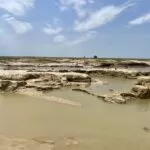
Bukar Zarami, a seasoned farmer from the Gongulong community, Jere Local Government Area of Borno, is one of those severely affected by the devastating floods that swept through the northeastern state of Nigeria on Sept. 10.
With over three decades of farming experience, Bukar told HumAngle that he has never witnessed a flood of such magnitude as his 3-hectare millet farm and additional hectares of guinea corn, beans, and cucumbers were destroyed entirely.
Climate change effects had already stifled his farm’s income for the past two years, but he was hopeful for a good harvest this season—until the floods took everything.
“I lost three hectares of millet that I planted. The remaining hectares, where I planted guinea corn, beans, and cucumbers, were also washed away,” he told HumAngle during a phone interview in October.
When he visited the farm some days ago to see if he could recover any of the washed-away produce, he only gathered a small portion of millet, which was not enough to feed his wife and children. Even worse, the salvaged millet caused stomach discomfort when they ate it.
“After my wife processed and cooked the millet I brought home, we all ate, but it gave us stomach aches that night,” Bukar explained. “I think the water that affected my farmland contained some chemicals; it felt slippery.”
Despite help from good samaritans since the devastating flood affected his farmland, Bukar’s family members are still faced with hunger amid a struggle to survive. “I haven’t sat idle. My farmland is still wet, so I have planted two bowls of beans again with the hope of a fruitful outcome,” he added.
‘A season of loss’
The September catastrophic flash flood affected not just Gongulong but numerous communities across Borno, leaving a trail of destruction. The United Nations’ Food and Agriculture Organization estimates that the crops and foods destroyed by the heavy floods would have fed 8.5 million people for six months. It added that the situation has further deepened the food crisis and hunger in the country.
Bintu Mustapha, another farmer who spoke to HumAngle from Dikwa, shared a similar plight. In her 14 years of farming, Bintu had relied on her vegetable and grain crops—okra, spinach, guinea corn, maize, and beans—to feed her six children and earn a small income. The floods, however, submerged her fields, leaving her family in despair.
“We have nothing left,” Bintu said. “Our means of survival have been cut off; we need support, especially in terms of food. My father suggested I replant cucumbers when the farmland stabilises, and I am looking forward to doing that,” Bintu told HumAngle.
‘They shouldn’t feel discouraged’
Isa Bukar Kumshe, a lecturer at the Mohammed Goni College of Agriculture in Maiduguri, said the recent flooding caused by heavy rainfall and the breakdown of the Alau Dam requires urgent action from necessary authorities.
He explained that seasonal changes are expected every few years, and the floods will continue to impact food security severely. “The water came with contaminants like dead bodies and animals. When these organic materials decompose, they release ammonia and other organic waste into the water, which can cause serious health implications. Farmers should avoid consuming crops directly affected by this water,” the expert warned.
Kumshe, however, urged farmers to replant using irrigation farming. “My advice to farmers is that there is still time to continue farming on their respective lands. They shouldn’t feel discouraged. They should return and replant their crops, especially through irrigation farming. The government must also step in to support these farmers by providing seeds and other farming inputs.”
Borno’s Governor, Babagana Zulum, has also called for urgent support from the World Food Programme (WFP) to aid recovery. He appealed to the WFP to support dry-season farming along riverbanks and provide improved seeds and solar-powered water pumps to help farmers reclaim their flooded lands.
This report was produced under the 2024 HumAngle Accountability Fellowship with support from the MacArthur Foundation.
Bukar Zarami, a farmer in Borno, Nigeria, suffered significant losses from devastating floods in September, which destroyed his crops, worsening the food crisis in the region. Despite previous climate impacts, Bukar hoped for a good harvest this season, but flooding ruined his millet, guinea corn, beans, and cucumbers. Other farmers, like Bintu Mustapha, also experienced similar losses, causing food insecurity and financial hardship.
Experts, including Isa Bukar Kumshe, highlight the danger of consuming flood-affected crops, as they may be contaminated with harmful substances.
Kumshe advises farmers to engage in irrigation farming and replant, with support from the government and agencies like the World Food Programme, which is urged to assist with resources such as seeds and water pumps. Governor Babagana Zulum advocates for urgent aid for dry-season farming to help farmers recover from the flood damages.
